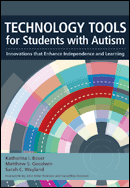New Book, “Technology Tools for Students with Autism,” Features Chapter by AIR Experts on Emerging Trends
Washington, D.C. – Small, portable technology is giving those with autism greater freedom and independence, according to two American Institutes for Research (AIR) experts who contributed the opening chapter for the newly published book, “Technology Tools for Students with Autism.”
 In the book, published by Brookes Publishing, educational technology researchers Tracy Gray and Alise Brann provide an overview of emerging trends as they relate to autism services.
In the book, published by Brookes Publishing, educational technology researchers Tracy Gray and Alise Brann provide an overview of emerging trends as they relate to autism services.
“The convergence of mainstream technology and assistive technology is a critical milestone in promoting accessibility and independence for users with disabilities,” said Gray, who leads the Center for Technology Implementation at AIR. “We have been tracking trends in educational technology and assistive technology for the past decade and they indicate a shift toward portable, networked, customizable, and multitasking tech solutions with touch interfaces that mirror consumer technology.”
Portability, the authors wrote, has many implications for those with autism spectrum disorders (ASD), including:
- Smaller, more portable devices mean smaller, less intrusive communication methods and less stigma with many people today using some type of electronic device.
- GPS-enabled devices allow people with ASD who struggle with directions to carry maps in their pocket and increasing their independence.
- Alerts and reminders can be programmed into most devices today, covering everything from upcoming appointments to behavior prompts.
“Increasing market demand for products that can be customized means that consumers with ASD can tailor their devices to meet their needs,” Brann noted. “Touch interfaces could be beneficial to some populations. The iPod Touch with an inexpensive application, for example, can serve as a customizable communication device for about $500, a cost that’s less than ten percent of a specialized communication device used by some with ASD.”
Gray and Brann also examine how the research and policy landscape is affecting providing services for people with autism.
“Technology Tools for Students with Autism” is available from Brookes Publishing and other online booksellers.
About AIR
Established in 1946, with headquarters in Washington, D.C., the American Institutes for Research (AIR) is a nonpartisan, not-for-profit organization that conducts behavioral and social science research and delivers technical assistance both domestically and internationally in the areas of health, education, and workforce productivity. For more information, visit www.air.org.
###